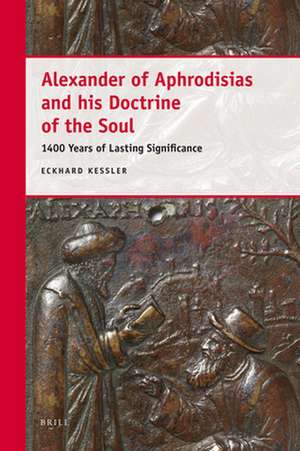Alexander of Aphrodisias and his Doctrine of the Soul: 1400 Years of Lasting Significance
Autor Eckhard Keßleren Limba Engleză Hardback – 21 iun 2011
Originally published as Volume XVI, No. 1 (2011) of Brill's journal Early Science and Medicine.
Preț: 479.79 lei
Preț vechi: 564.46 lei
-15% Nou
Puncte Express: 720
Preț estimativ în valută:
91.81€ • 100.04$ • 77.36£
91.81€ • 100.04$ • 77.36£
Carte indisponibilă temporar
Doresc să fiu notificat când acest titlu va fi disponibil:
Se trimite...
Preluare comenzi: 021 569.72.76
Specificații
ISBN-13: 9789004207028
ISBN-10: 9004207023
Pagini: 100
Dimensiuni: 160 x 240 x 25 mm
Greutate: 0.79 kg
Editura: Brill
Colecția Brill
ISBN-10: 9004207023
Pagini: 100
Dimensiuni: 160 x 240 x 25 mm
Greutate: 0.79 kg
Editura: Brill
Colecția Brill
Cuprins
1. Alexander of Aphrodisias in the History of Ancient Philosophy
1.1.Alexander, the ‘Exegete’ of Aristotle 3
1.2. Alexander’s Extant and Lost Writings 5
1.3. Alexander’s Position in the Neoplatonic School 8
2. The Reception of Alexander from the End of the Fifth to the End of the Fifteenth Century
2.1. Alexander among the Arabs: Averroes and the Predominance of the Doctrine of the Soul 10
2.2. Alexander in Scholasticism: Immortality and Theory of Cognition—Buridan and Argyropulus 18
3. The Transition at the Turn from the Fifteenth to the Sixteenth Century
3.1. Girolamo Donato and his Translation of the “Enarratio de anima ex Aristotelis institutione” 25
3.2. The Use of Donato’s Translation by Nicoletto Vernia 30
3.3. Philology and Philosophy: Two Modes of Reception of Donato’s Alexander in Agostino Nifo 36
3.4. Nifo’s ‘Saving’ of Alexander 43
4. Alexander in the Sixteenth Century
4.1. Alexander and the Problem of Immortality: Cardano, Zabarella 49
4.2. From Alexander’s Doctrine of the Soul to the New Philosophy of Nature: Pietro Pomponazzi 58
4.3. Manifestations of Natural Philosophy in the Tradition of Alexander in the Sixteenth Century:
Porzio, Fracastoro, Cardano 67
4.4. Bernardino Telesio: the Krypto-Alexandrist as ‘First of the Moderns’ 74
5. Bibliography
5.1. Sources 82
5.1.1. Alexander of Aphrodisias 82
5.1.2. Other Sources 84
5.2. Secondary Literature 86
1.1.Alexander, the ‘Exegete’ of Aristotle 3
1.2. Alexander’s Extant and Lost Writings 5
1.3. Alexander’s Position in the Neoplatonic School 8
2. The Reception of Alexander from the End of the Fifth to the End of the Fifteenth Century
2.1. Alexander among the Arabs: Averroes and the Predominance of the Doctrine of the Soul 10
2.2. Alexander in Scholasticism: Immortality and Theory of Cognition—Buridan and Argyropulus 18
3. The Transition at the Turn from the Fifteenth to the Sixteenth Century
3.1. Girolamo Donato and his Translation of the “Enarratio de anima ex Aristotelis institutione” 25
3.2. The Use of Donato’s Translation by Nicoletto Vernia 30
3.3. Philology and Philosophy: Two Modes of Reception of Donato’s Alexander in Agostino Nifo 36
3.4. Nifo’s ‘Saving’ of Alexander 43
4. Alexander in the Sixteenth Century
4.1. Alexander and the Problem of Immortality: Cardano, Zabarella 49
4.2. From Alexander’s Doctrine of the Soul to the New Philosophy of Nature: Pietro Pomponazzi 58
4.3. Manifestations of Natural Philosophy in the Tradition of Alexander in the Sixteenth Century:
Porzio, Fracastoro, Cardano 67
4.4. Bernardino Telesio: the Krypto-Alexandrist as ‘First of the Moderns’ 74
5. Bibliography
5.1. Sources 82
5.1.1. Alexander of Aphrodisias 82
5.1.2. Other Sources 84
5.2. Secondary Literature 86
Notă biografică
Eckhard Kessler, Ph. D. (1968) and Habilitation (1974) in Philosophy, is Professor emeritus of Renaissance Philosophy of the Ludwig-Maximilians Universität, München. He has published widely on Humanistic and Aristotelian Philosophy, among others as coeditor of The Cambridge History of Renaissance Philosophy (Cambridge U.P. 1988).
